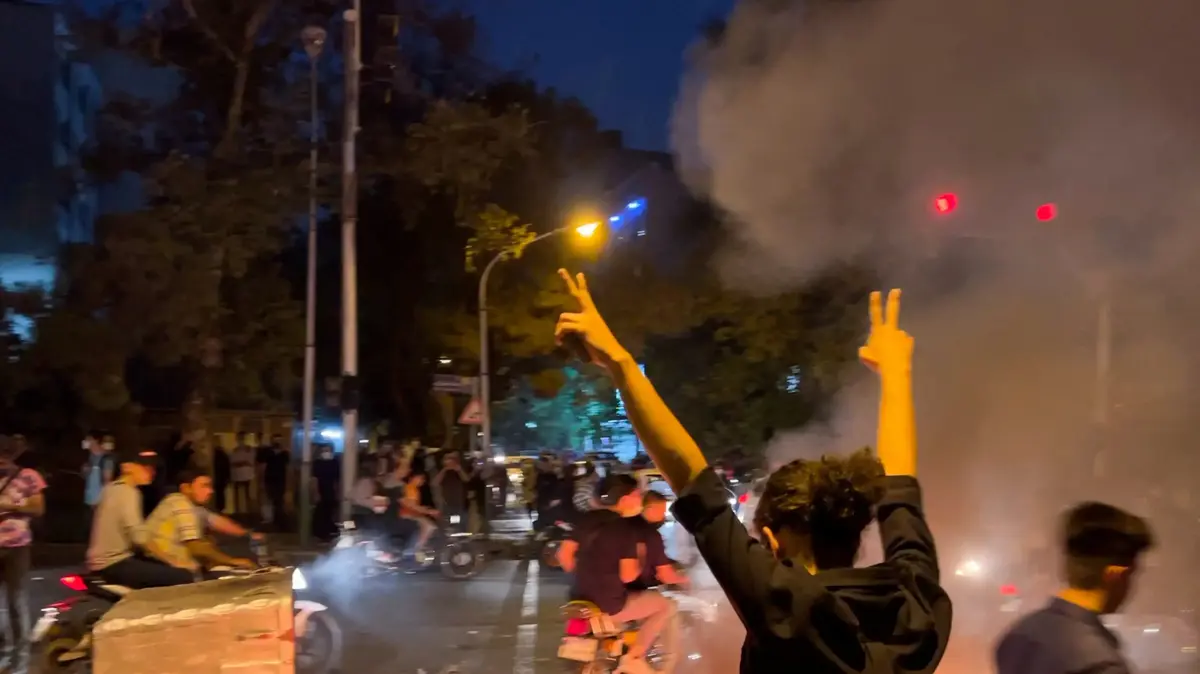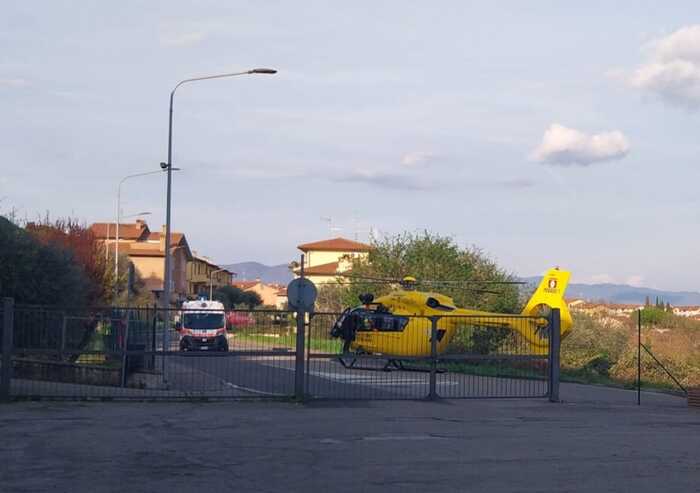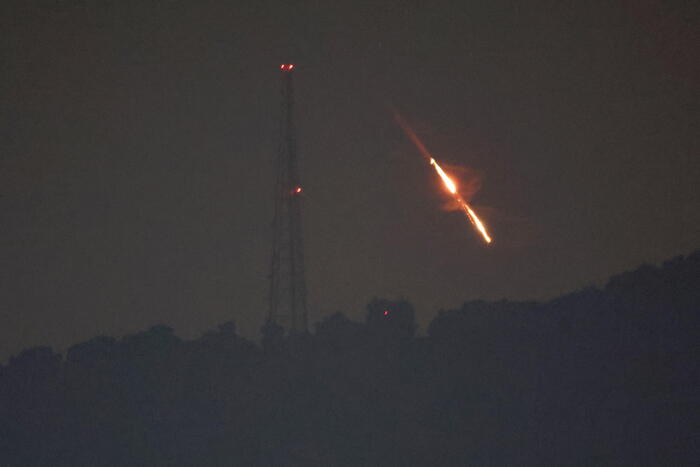A medical team transports a student from the Isfahan University of Technology in Iran.
(Credit: 1500Tasvir)
(CNN) --
Concern is mounting in Iran after reports emerged that hundreds of school girls have been poisoned across the country in recent months.
On Wednesday, Iran's semi-official Mehr News reported that Shahriar Heydari, a member of Parliament, cited an anonymous "reliable source" as saying that "almost 900 students" across the country had been poisoned so far.
The first reported poisonings occurred in the city of Qom on November 30, 2022, when 18 female students from a high school were hospitalized, according to Iranian state media.
In another incident in Qom, on February 14, 2023, more than 100 students from 13 schools were taken to hospitals;
the state-affiliated Tasnim news agency described these events as “serial poisonings”.
There have also been reports of schoolgirls being poisoned in the capital Tehran: 35 girls were hospitalized there on Tuesday, according to Fars News.
They were in "good" condition, and many of them were later released, Fars reported.
State media have also reported poisonings of students in recent months in the city of Borujerd and in the provinces of Chaharmahal and Bakhtiari.
Many of the reports involve students from girls' schools, but state media have also reported at least one poisoning incident at a boys' school on February 4 in Qom.
advertising
CNN has reached out to one of the schools named by state media for having had a poisoning incident, the Noor Yazdanshahr Conservatory in Qom, as well as teachers at those schools, but has not received a response.
Near-bomb-grade enriched uranium found at Iran nuclear power plant, IAEA report reveals
A medical team loads a patient into an ambulance at the Halban Zaker Girls' School in the Iranian city of Ardabil. (Credit: 1500Tasvir)
Iranian Health Minister Bahram Einollahi, who visited the affected students in Qom, said on February 15 that the symptoms included muscle weakness, nausea and tiredness, but that the "poisoning" was mild, according to a media report. state-run Iranian Students' News Agency.
Einollahi said his team had taken many samples from patients admitted to a Qom hospital for further testing at Iran's renowned Pasteur Institute, which reported that no microbes or viruses had been identified in the samples, according to ISNA.
It is unclear if the incidents are related and if the students were targeted.
But Iran's Deputy Health Minister in charge of Research and Technology, Younes Panahi, said on February 26 this year that the poisonings were "chemical" in nature, but denied that they were chemical compounds used in warfare and that the symptoms were not they were contagious, according to IRNA.
Panahi added that it appears the poisonings were deliberate attempts to target and shut down girls' schools, according to IRNA.
"After the poisoning of several female students in Qom...it became clear that people wanted all schools to be closed, especially those for girls," Younes Panahi said at a press conference on Sunday, according to Iranian state media IRNA.
He later retracted the comment, saying it was misquoted, the Fars News said.
But a mother of two girls in Qom told CNN that both of her daughters had been poisoned, at two different schools, and one of them had experienced significant health problems after being poisoned last week.
She spoke on condition of anonymity due to the sensitivity of the reports and fears for the safety of her family.
"One of my daughters was poisoned at school last week," the mother told CNN on Tuesday.
She said that she spent two days at the Shahid Beheshti Hospital in Qom along with other schoolgirls and staff.
Her daughter experienced nausea, shortness of breath and numbness in her left leg and right hand, she said.
“Now he has problems with his right foot and it is difficult for him to walk,” said the mother.
Iran uses clandestine sites to torture government opponents, exclusive CNN investigation reveals
Calls for investigations into poisonings grow
Local activists and national political figures have called on the government to do more to investigate the poisonings.
“The poisoning of students in girls' schools, which have been confirmed as deliberate acts, was not arbitrary or accidental,” Mohammad Habibi, a spokesman for the Iran Teachers' Trade Association, tweeted on February 26.
Habibi is among a growing number of people who believe the poisonings may be linked to recent protests by the "Woman, Life, Freedom" movement.
The movement has been characterized by outpouring of anger from women and girls over issues ranging from freedoms in the Islamic Republic to the crippling state of the economy.
"To erase the gains in freedom of clothing, (the authorities) need to increase public fear," Habibi tweeted.
US State Department spokesman Ned Price called the reports of schoolgirl poisoning "very disturbing" during a briefing on Wednesday.
"We've seen these reports, they're very disturbing, they're very concerning reports," Price said.
"Poisoning girls who are just trying to learn is just an abominable act."
Price urged "Iranian authorities to fully investigate these reported poisonings and do everything possible to stop them and hold the perpetrators accountable."
In mid-February, the Tasnim news agency reported that Iran's Education Minister Yousef Noori said that "most" of the conditions of the students were caused by "rumors that have scared people" and that "it is not there is a problem".
He said that some students had been hospitalized due to "underlying conditions," according to Tasnim.
Iranian authorities shoot and detain students from elite university in Tehran
Dan Kaszeta, a London-based defense specialist and associate fellow at the Royal United Services Institute, spoke to CNN about the difficulties authorities may face in confirming reports like these.
“Unfortunately, it can be very difficult to investigate these types of incidents.
Often the only way to discover the causative agent is to collect samples at the time of dissemination, and this is often difficult or impossible,” he said.
“These current incidents in Iran are remarkably similar to dozens of incidents at schools in Afghanistan since about 2009. In some of these incidents, pesticides were strongly suspected, but most of the illnesses remain unexplained,” he added.
Kaszeta went on to explain that odors are difficult to use as an indicator.
"Some things have added odor, since the underlying hazardous chemical may be odorless."
Jamileh Kadivar, a prominent Iranian politician and former member of Parliament, also believes there are malicious intentions behind the poisonings.
“The continuity and frequency of school poisonings over the last three months demonstrates that these incidents cannot be accidental and are likely the result of organized group actions led by expert groups and directed at specific targets,” he wrote in an article from opinion in the Iranian state newspaper Etelaat.
Iranian Education Minister Yousef Nouri visited some of the female students who were hospitalized in Qom after the series of school poisonings in mid-February, saying a special team had been formed in Tehran to follow up on the problem, according to a report in the state agency Tasnim.
Iran's national police chief Ahmadreza Radan said on February 28 that they are investigating the cause behind the "poisonings" and that no one has been arrested and authorities are still trying to determine whether the suspected poisonings are intentional or not. according to IRNA.
Poisoning












